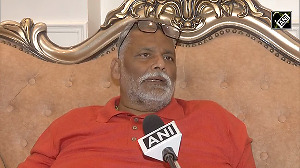It would be a virtual tightrope walk for the Congress at the impending Plenary Session in Hyderabad.
Enjoying the luxury of power at the Centre, Congress would have to trudge the middle path on key issues like alliances, lest it sends wrong singals to its allies in the coalition.
Party leaders say in Hyderabad that the Congress could ill-afford to lose sight of the fact that it was currently conducting its first coalition experiment at the Centre.
In such a scenario, brave talk of going it alone and single-party rule would be suicidal and what was needed was chanting the mantra of coalition and alliances, they say.
The dramatic shift in the political scene since the Plenary Session at Bangalore in March 2001, which saw Bharatiya Janata Party-led National Democratic Alliance out of power at the Centre would automatically necessiate a shift in its stance.
The mantra of anti-BJP alliance pursued vigorously by Sonia Gandhi after the Shimla conclave of senior leaders in 2003, which called for coming together of secular forces had done the trick for the Congress.
Phrases like 'Congress has a lot to learn about running coalitions' are now being heard from responsible leaders of the party. It was these same leaders who used to boast, a decade ago, that Congress has never shared power at the Centre.
Senior leader Pranab Mukherjee is heading the Committee, which is drafting resolutions for the meet. Another veteran, Arjun Singh, is leading the sub-committee that will prepare the political resolution.
In fact, the plank of stability and providing single-party rule was the unique selling point of Congress till a decade back.
P V Narasimha Rao was the last Congress prime minister in the single-party rule era as he provided stability for a full
term from 1991 to 1996, despite initially Congress was in a minority.
Congress has gained majority at the Centre way back in 1984, when the elections were held after the assassination of Indira Gandhi.
A section of party leaders are now talking of the idea of 'healthy competition' in the states in the changed scenario where the Congress has some powerful regional parties as allies in some states.
This section feels that the party was losing space in states where it was entering into a coalition as regional parties were gaining in strength in such an arrangement.
Another key issue that the party would have to face at the Hyderabad plenary was how to revive the organisation in Uttar Pradesh and Bihar as, without that, the Congress could not even dream of having a single-party rule at the Centre.
Some party leaders feel that Congress could have done much better in Bihar if it had allowed 'healthy competition' and not become a partner of the Lalu Prasad-led Rashtriya Janata Dal whose track record in governance was dismal.
The session would also have to devise a strategy for the Assembly elections in five states, including West Bengal, Tamil
Nadu and Kerala where the party prospects were not that bright.





